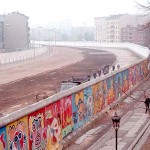 Even in our usual and familiar haunts, we are all, in numerous respects, exiles and strangers, even deportees. Stamps of departure, visas, temporary residence permits, even banning orders, crowd the pages of our passports. As adults, we have used our one-way ticket from infancy and childhood. As cultural beings, we have immigrated from our animal condition. As speakers of a language, we have been translated from inarticulate cries and grunts. Like travelers and immigrants, we never completely lose the accents and shed the usages of those lands whence we have come. The notion of a complete arrival (like that of a clean break) is a myth. The metaphor of immigration and naturalisation thus applies across a broad range of what we are, both to ourselves and to others. This year, in the company of works and texts of various styles and genres, we shall investigate the borderline. We shall explore the stresses and strains of departure and expulsion, the shifts of ways, and the often welcome results of repositioning, both in the frame of large cultural mutations, real and imagined, and more individually. We shall journey with some trekkers who are especially articulate about the strange devices on their passports, we shall look at the dangerous seductiveness of equating the familiar (the “normal”) with the natural, and we shall examine several who profess to be able to identify, for once and for all, a home and native land where we are in no way foreign.
Even in our usual and familiar haunts, we are all, in numerous respects, exiles and strangers, even deportees. Stamps of departure, visas, temporary residence permits, even banning orders, crowd the pages of our passports. As adults, we have used our one-way ticket from infancy and childhood. As cultural beings, we have immigrated from our animal condition. As speakers of a language, we have been translated from inarticulate cries and grunts. Like travelers and immigrants, we never completely lose the accents and shed the usages of those lands whence we have come. The notion of a complete arrival (like that of a clean break) is a myth. The metaphor of immigration and naturalisation thus applies across a broad range of what we are, both to ourselves and to others. This year, in the company of works and texts of various styles and genres, we shall investigate the borderline. We shall explore the stresses and strains of departure and expulsion, the shifts of ways, and the often welcome results of repositioning, both in the frame of large cultural mutations, real and imagined, and more individually. We shall journey with some trekkers who are especially articulate about the strange devices on their passports, we shall look at the dangerous seductiveness of equating the familiar (the “normal”) with the natural, and we shall examine several who profess to be able to identify, for once and for all, a home and native land where we are in no way foreign.
Teaching team
- Lisa Brocklebank
- Robert Crawford (Political Science)
- Anisha Datta
- Mark Glouberman (Philosophy)
- Caroline Williams (Classics)
Texts
- Homer, Iliad
- Sophocles, Oedipus the King
- The Ramayana
- Euripides, Medea
- Plato, Republic
- Ovid, Metamorphoses
- Shakespeare, The Tempest
- Descartes, Meditations
- Blake, Songs of Innocence and Experience
- Blake, Marriage of Heaven and Hell
- Rousseau, Discourse on Inequality
- Shelley, Frankenstein
- Marx, Marx-Engels Reader
- Tagore, The Home and the World
- Conrad, Heart of Darkness
- Forster, A Passage To India
- Woolf, Orlando
- Rushdie, Midnight’s Children
- Levi, Survival in Auschwitz
- Miller, The Crucible
- Derek Walcott, Poetry Selections
- The Bhagavat-Gita


